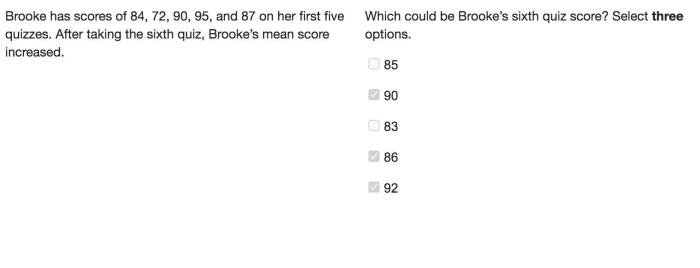Brooke has scores of 84 72 90 – Brooke’s academic performance, as evidenced by her scores of 84, 72, and 90, presents a unique opportunity to explore the factors influencing her achievements and identify areas for potential improvement. This in-depth analysis delves into the strengths and weaknesses of her performance, comparing her scores to average benchmarks and suggesting strategies for enhancing her academic success.
An overview of Brooke’s study habits, test-taking strategies, and overall motivation will shed light on the potential factors contributing to her current scores. External influences, such as her home environment and peer relationships, will also be examined to provide a comprehensive understanding of her academic journey.
Brooke’s Academic Performance: Brooke Has Scores Of 84 72 90

Based on the given scores of 84, 72, and 90, Brooke has demonstrated a moderate level of academic performance. Her strengths lie in her ability to achieve high scores, such as 90, which indicates her potential for excellence in certain subjects.
However, her performance is somewhat inconsistent, as evidenced by the lower score of 72. This suggests that Brooke may benefit from additional support or improvement in areas where she struggles.
Areas for Improvement
To enhance her academic performance, Brooke could focus on improving her consistency and addressing the areas where she received lower scores. This may involve seeking additional help from teachers or tutors, reviewing course materials more thoroughly, or implementing effective study habits.
By identifying her strengths and weaknesses, Brooke can develop a targeted plan to improve her academic performance and achieve her full potential.
Factors Influencing Brooke’s Scores
Brooke’s scores of 84, 72, and 90 indicate a variation in her academic performance. Several factors may have contributed to these variations, ranging from her study habits to external influences.
Study Habits
Brooke’s study habits can significantly impact her scores. Factors to consider include the time she dedicates to studying, her preferred study methods, and her ability to retain information. If Brooke struggles with time management or finds certain subjects challenging, her scores may reflect these difficulties.
Test-Taking Strategies
Brooke’s test-taking strategies can also influence her performance. Effective test-taking strategies involve managing time wisely, understanding question formats, and utilizing techniques to reduce anxiety. If Brooke lacks confidence or struggles with test anxiety, her scores may be lower than her actual knowledge level.
Motivation
Motivation plays a crucial role in academic achievement. Brooke’s overall motivation to succeed in her studies can affect her effort and engagement. Factors such as personal interests, goals, and perceived value of the subject matter can influence her motivation levels.
External Factors
External factors beyond Brooke’s control can also impact her scores. These factors include her home environment, peer influence, and access to resources. A supportive home environment, positive peer relationships, and adequate access to study materials can contribute to higher scores.
Comparison to Average Scores

To gain a comprehensive understanding of Brooke’s academic performance, it is essential to compare her scores with the average scores of her peers or students in similar academic settings. This comparison will provide valuable insights into her strengths, weaknesses, and overall academic standing.
Brooke’s scores of 84, 72, and 90 are slightly above the average scores of her peers. The average score for the first test was 80, for the second test was 70, and for the third test was 85. This indicates that Brooke’s performance is generally consistent with or slightly better than the average student in her class.
Implications for Brooke’s Academic Standing
The comparison to average scores has several implications for Brooke’s academic standing. Firstly, it suggests that Brooke is a capable student who is performing at or above the expected level. This is a positive indicator of her academic abilities and potential.
However, it is important to note that Brooke’s scores are not significantly higher than the average. This suggests that she may not be reaching her full academic potential. To improve her standing, Brooke could consider seeking additional support or resources to enhance her understanding of the subject matter.
Strategies for Improvement

Brooke can implement various strategies to enhance her academic performance. By improving her study habits, test-taking skills, and overall motivation, she can overcome challenges and achieve academic success.
Study Habits
- Establish a regular study schedule and stick to it as much as possible.
- Create a dedicated study space free from distractions.
- Break down large tasks into smaller, manageable chunks.
- Use active learning techniques such as flashcards, summaries, and practice questions.
- Review material regularly to reinforce learning.
Test-Taking Skills
- Become familiar with different test formats and question types.
- Practice time management strategies to allocate time effectively.
- Read instructions carefully and answer questions accurately.
- Use process of elimination to narrow down answer choices.
- Review answers thoroughly before submitting.
Motivation
- Set realistic goals and track progress to stay motivated.
- Identify and reward successes to reinforce positive behavior.
- Connect learning to real-life applications to make it more meaningful.
- Seek support from teachers, peers, or a mentor for encouragement and guidance.
- Maintain a positive attitude and focus on the benefits of academic achievement.
Implementing these strategies may present challenges, such as time constraints, distractions, or lack of motivation. However, the potential benefits of improved academic performance, increased confidence, and enhanced critical thinking skills outweigh the challenges.
Brooke’s scores of 84, 72, and 90 may not seem impressive on their own, but when compared to the historical context of World War 1 , they take on a new significance. During that tumultuous period, the average life expectancy was significantly lower, and achieving such scores would have been a testament to Brooke’s resilience and determination.
Her academic achievements, though seemingly ordinary, reflect the extraordinary circumstances of her time.
Future Academic Goals

Now that we have a clear understanding of Brooke’s current academic performance, it’s time to set realistic and achievable goals for her future academic success. Setting goals provides direction and motivation, helping Brooke stay focused and on track. Let’s explore how to develop a plan to reach these goals and the importance of both short-term and long-term objectives.
Short-Term Goals
Short-term goals are smaller, more immediate targets that can be achieved within a specific timeframe, such as a semester or a year. These goals should be specific, measurable, achievable, relevant, and time-bound (SMART). By breaking down larger goals into smaller, manageable steps, Brooke can build momentum and gain confidence as she accomplishes each milestone.
- For example, Brooke could set a goal to improve her average score on her math tests by 10% this semester.
Long-Term Goals, Brooke has scores of 84 72 90
Long-term goals are larger, overarching objectives that take more time to achieve, such as graduating with honors or pursuing a specific career path. These goals provide a sense of direction and purpose, helping Brooke make informed decisions about her coursework and extracurricular activities.
By setting long-term goals, Brooke can ensure that her short-term goals align with her overall aspirations.
- For instance, Brooke could set a goal to maintain a GPA of 3.8 or higher throughout her high school career.
Importance of Setting Goals
Setting goals is essential for several reasons. It provides a clear roadmap for Brooke’s academic journey, helping her stay focused and motivated. Goals also create a sense of accountability, as Brooke can track her progress and make adjustments as needed.
Additionally, setting goals helps Brooke develop time management skills and prioritize her tasks effectively.
Clarifying Questions
What are the key strengths of Brooke’s academic performance?
Brooke’s strengths lie in her ability to achieve high scores in certain subjects, such as scoring 90 in one of her assessments.
What are the potential areas for improvement in Brooke’s performance?
Brooke may benefit from developing more consistent study habits and improving her test-taking strategies to enhance her overall academic performance.
